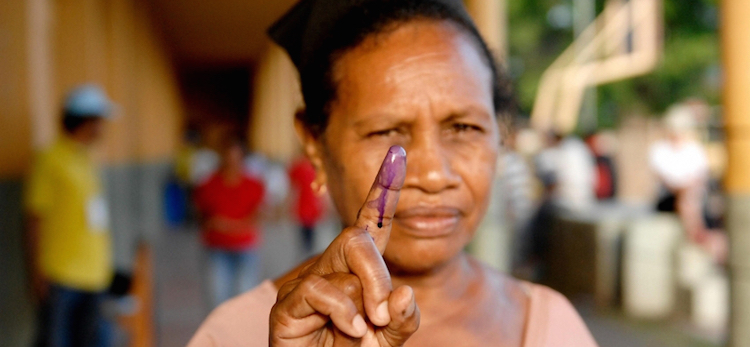By Santo D. Banerjee
NEW YORK (IDN) – UN Secretary-General António Guterres has in a message for the International Day against Nuclear Tests warned of resurgent nuclear menace and called for a complete ban on testing. Following is the full text of his message.
Commemorated annually since 2010 on the anniversary of the closure of the Semipalatinsk test site in Kazakhstan, the International Day against Nuclear Tests takes on special meaning in 2020 in also marking 75 years since the first-ever nuclear test, code named “Trinity”, was undertaken in July 1945 in the United States.
Since then, more than 2,000 nuclear tests have been conducted by at least 8 countries, with profound, harmful and long-lasting effects on the environment, human health and the economic development of some of the world’s most fragile regions.
Despite these impacts and the widespread global support for a legally binding prohibition, the Comprehensive Nuclear-Test-Ban Treaty has yet to enter into force. I once again urge all States that have not signed or ratified the Treaty to do so without further delay.
The nuclear menace is once again on the rise. A complete ban on nuclear testing is an essential step in preventing the qualitative and quantitative improvement of nuclear weapons and in achieving nuclear disarmament. On this International Day, we also recognize the survivors of nuclear tests and the suffering that they have endured and that our world will endure for decades and even generations.
The best way to honour the victims of nuclear tests is to prevent any in the future. Nuclear testing is a relic of another age and should have no place in the twenty-first century.
Addressing the virtual High-level Meeting of the United Nations General Assembly to commemorate the International Day against Nuclear Tests 2020, UN High Representative for Disarmament Affairs, Ms Izumi Nakamitsu, said: “I am happy to note that despite the COVID-19 pandemic and its terrible ramifications, we are still able to recognise this important day.” She was representing the UN Secretary-General.
Following are extracts from the text of her statement:
The International Day against Nuclear Tests has been commemorated since 2010 to mark the closing, in 1991, of the nuclear test site in Semipalatinsk, Kazakhstan, the largest nuclear test site in the former Soviet Union.
In 2020, this day takes on an even more special meaning. It was 75 years ago, in July 1945, that the first-ever nuclear test, code named Trinity, was conducted in the United States.
Trinity not only resulted in the actual use of nuclear weapons in Hiroshima and Nagasaki 75 years ago but also initiated a decades-long series of more than 2,000 nuclear tests, conducted by at least eight countries, resulting in profound harmful effects on the environment, human health and the economic development of populations in many of our world’s most vulnerable regions.
These effects are being felt even today, many years after the tests had been conducted. The testimonies of survivors, some of which we will hear today, attest to the horrific damage that nuclear tests invariably cause.
The Comprehensive Nuclear-Test-Ban Treaty, which bans all nuclear explosions, is at the core of our efforts to confine nuclear testing to the pages of history. But even though almost a quarter-century has passed since the adoption of the Treaty in 1996, and despite its widespread support – with 184 signatories and 168 ratifying States – it has still not entered into force, requiring the ratification of eight so-called “Annex 2” states to do so.
The norm against nuclear testing is one of the most significant achievements of the Cold War. Yet today it is seemingly under threat as relations between nuclear-armed States become increasingly hostile and they seek to improve the quality and, in some cases, quantity, of their nuclear arsenals.
In this fraught geostrategic environment, we need to re-double our efforts to uphold the norm against nuclear testing. The voluntary moratoria imposed by most nuclear-armed States are welcome, but a legally binding prohibition is the best bulwark against any future tests. It is also an important vehicle to prevent further proliferation of nuclear weapons, reduce tension among nuclear powers, and to help shepherd countries back to the path leading to the total elimination of nuclear weapons.
On this solemn occasion, I wish to reiterate the Secretary-General’s call for all States that have not yet done so, to sign and ratify the Comprehensive Nuclear-Test-Ban Treaty, especially those whose ratification is needed for the Treaty’s entry into force. There are no excuses for further delay in achieving a noble goal of achieving a global ban, to ensure that we never repeat the horrific human and environmental catastrophe caused by nuclear tests. [IDN-InDepthNews – 27 August 2020]
Photo: UN Secretary-General António Guterres. Photo courtesy the UN.
IDN is flagship agency of the International Press Syndicate.
Visit us on Facebook and Twitter.
This article is published under the Creative Commons Attribution 4.0 International licence. You are free to share, remix, tweak and build upon it non-commercially.

